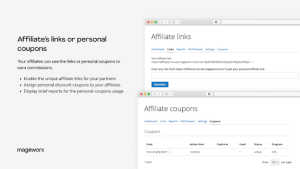Did you know that businesses utilizing affiliate marketing programs experience an average of 30% increase in sales? With the e-commerce industry growing rapidly, affiliate marketing has emerged as a powerful strategy for driving revenue and expanding brand reach.
In fact, studies show that 40% of Magento-powered online stores leverage affiliate programs to boost their sales and establish a strong online presence.
In this comprehensive guide, we will provide you with everything you need to know to launch and run a highly effective Magento affiliate program to maximize sales for your store, backed by data-driven strategies and industry best practices. Get ready to supercharge your eCommerce success with affiliate marketing.
Table of Contents
Affiliate Marketing in Numbers
Launching an affiliate program can yield significant benefits for businesses. Here are some statistics on the impact of affiliate marketing programs:
- Affiliate marketing spending in the United States is projected to reach $8.2 billion by 2022. (Source: Forrester)
- Affiliate programs can contribute to a substantial increase in sales. Data from Rakuten Marketing reveals that companies that adopt affiliate marketing witness an average of 23% increase in revenue. (Source: Rakuten Marketing)
- Affiliate marketing drives online sales for numerous businesses. The Affiliate Marketing Benchmark Report 2021 highlights that affiliate marketing contributes to 16% of all eCommerce sales. (Source: Awin)
- Conversion rates tend to be higher for customers acquired through affiliate marketing. Monetate’s eCommerce Quarterly Report states that customers referred by affiliates have a 5.5% higher conversion rate compared to other acquisition channels. (Source: Monetate)
- Affiliates can play a crucial role in brand discovery and awareness. A survey by Rakuten Affiliate Network found that 81% of consumers’ online purchase decisions were influenced by the recommendations of bloggers and influencers. (Source: Rakuten Affiliate Network)
- Affiliate programs can provide a strong return on investment. A study conducted by Forrester Consulting on behalf of Rakuten Marketing reported an average return of $6.85 for every $1 spent on affiliate marketing. (Source: Rakuten Marketing)
Key Steps to Launching and Running Affiliate Program
Launching and running a highly effective Magento affiliate program requires careful planning and strategic execution. Here are the key steps to guide you through the process:
Step #1: Set Clear Goals and Objectives
Begin by defining your goals and objectives for the affiliate program. Determine what you aim to achieve, whether it’s increasing sales, expanding brand reach, driving website traffic, or all of the above. Clear goals will help you shape your program structure and measure success.
Step #2: Choose a Reliable Affiliate Management Extension
Magento offers various affiliate management extensions that simplify the process of tracking affiliate referrals, managing commissions, and providing affiliates with promotional materials.
Research and select a reliable extension that aligns with your program’s needs and functionality requirements.
The Affiliate extension by Mageworx is a great example of a third-party extension that allows you to effectively manage and optimize affiliate programs.
Mageworx’s Affiliate extension
The Affiliate Extension by Mageworx offers a range of powerful features designed to enhance the functionality and performance of your affiliate program within the Magento platform. Here are some of its top features:
- Flexible commission structures: With this extension, you can define various commission structures based on product categories, individual products, or fixed amounts per referral. This flexibility allows you to tailor commission rates to align with your business goals and incentivize affiliates effectively.
- Multi-level marketing (MLM): The extension supports multi-level marketing, enabling you to create commission tiers and reward affiliates for referring new affiliates to the program. This MLM feature encourages affiliates to expand your affiliate network and drive further growth.
- Tracking and reporting: The Affiliate Extension provides accurate tracking of affiliate referrals, sales, and commissions. This feature allows you to monitor affiliate performance, measure the effectiveness of your campaigns, and make informed decisions for program optimization.
- Affiliate dashboard and portal: The extension includes an intuitive and user-friendly affiliate dashboard and portal. Affiliates can access this dedicated area to view their earnings, generate referral links, access promotional materials, and monitor their performance. This feature streamlines communication and provides affiliates with the necessary tools to effectively promote your products or services.
- Customizable promotional materials: You can create a variety of promotional materials, such as links and coupon codes, within the extension. These customizable materials empower affiliates to effectively promote your brand while maintaining consistency with your branding guidelines.
- Automated commission payouts: The extension offers automated commission payout functionality, streamlining the process of compensating affiliates. Merchants can set up predefined payout rules based on minimum balance thresholds, payment methods, and frequency. This automation saves time and ensures timely and accurate payments to affiliates.
- Affiliate registration and approval: You have control over the affiliate registration process, allowing you to review and approve affiliate applications manually or automatically. This feature ensures that your affiliate program maintains a high level of quality and aligns with your brand values.
- Email notifications and messaging: The Affiliate Extension includes customizable email notifications and messaging capabilities. You can send automated notifications to affiliates for various events, such as new referrals or commission updates. Additionally, you can communicate directly with affiliates through the messaging feature, fostering better collaboration and support.

Step #3: Define Commission Structure and Policies
Establish a commission structure that motivates affiliates while aligning with your business goals. Determine whether you’ll offer a percentage of sales, fixed commission per referral, or a combination. Also, define any commission tiers, bonus structures, and cookie durations. Additionally, establish clear policies and guidelines for affiliates, covering promotional methods, prohibited activities, and brand guidelines.
Step #4: Recruit and Onboard Affiliates
Reach out to potential affiliates who align with your target audience and industry. Consider partnering with influencers, bloggers, content creators, and niche websites that can effectively promote your products. Provide them with a compelling offer, clear program details, and promotional materials to facilitate their promotion. Streamline the onboarding process with clear instructions and a dedicated affiliate portal.
Step #5: Provide Marketing Materials and Tools
Equip affiliates with a range of marketing materials such as banners, text links, product images, and discount codes. Make these assets easily accessible in the affiliate portal and regularly update them to keep affiliates engaged and equipped with fresh content.
Step #6: Track and Monitor Performance
Utilize the tracking capabilities of your chosen affiliate management extension to monitor affiliate performance. Measure key metrics such as sales, clicks, conversion rates, and revenue generated by affiliates. Regularly analyze the data to identify top-performing affiliates, optimize campaigns, and refine your program strategy.
Step #7: Offer Ongoing Support and Communication
Maintain open lines of communication with your affiliates. Provide timely support, address queries, and offer guidance when needed. Foster a sense of community by organizing webinars, sharing success stories, and providing regular program updates to keep affiliates engaged and motivated.
Step #8: Optimize and Expand
Continuously optimize your affiliate program based on performance insights. Experiment with different commission structures, promotional strategies, and incentive programs. Explore opportunities to expand your affiliate network by seeking new partnerships and leveraging affiliate recruitment platforms.
Best Practices for Successful Affiliate Programs
To ensure the success of your affiliate program, it’s important to follow best practices that foster strong relationships with your affiliates and drive optimal results. Here are some key best practices for running a successful affiliate program:
- Clearly define program guidelines: Establish clear guidelines and policies for your affiliate program. Clearly communicate the commission structure, promotional methods, brand guidelines, prohibited activities, and any other important program details. This clarity helps affiliates understand expectations and promotes the consistent and ethical promotion of your products or services.
- Recruit quality affiliates: Focus on recruiting affiliates who align with your target audience and have a genuine interest in your niche. Look for affiliates with a proven track record of driving quality traffic and conversions. Quality affiliates can bring in more relevant traffic and effectively promote your offerings, leading to higher conversions and better results.
- Provide Compelling Promotional Materials: Offer a wide range of promotional materials to your affiliates, including banners, text links, product images, and exclusive discount codes. Ensure that the materials are visually appealing, professionally designed, and easily accessible. The availability of engaging and high-quality promotional assets increases the likelihood of affiliates effectively promoting your products or services.
- Offer competitive commissions and incentives: Design a commission structure that provides competitive payouts to your affiliates. Consider offering tiered commissions or performance-based incentives to motivate affiliates to achieve better results. Regularly evaluate and adjust your commission rates and incentives to ensure they remain attractive in the market and align with your program goals.
- Provide real-time tracking and reporting: Utilize an affiliate tracking system that provides real-time tracking and reporting capabilities. This allows affiliates to monitor their performance and earnings accurately. Transparent reporting builds trust and encourages affiliates to continue promoting your products or services.
- Communicate and support regularly: Maintain open lines of communication with your affiliates. Provide them with timely updates, program announcements, and relevant resources to assist their promotional efforts. Offer support through various channels, such as email, chat, or a dedicated affiliate manager. Engage with affiliates regularly, address their queries promptly, and foster a sense of community to build stronger relationships.
- Continuously optimize and test: Regularly analyze and optimize your affiliate program. Monitor performance metrics, such as click-through rates, conversion rates, and overall revenue generated. Identify top-performing affiliates and collaborate with them to maximize results. Experiment with different promotional strategies, commission structures, and offers to find what works best for your specific audience and niche.
- Stay compliant with regulations: Adhere to applicable laws and regulations, such as FTC guidelines and data privacy laws. Educate your affiliates about their obligations and provide them with guidelines on ethical and compliant promotional practices. Ensuring compliance not only protects your brand’s reputation but also builds trust among customers and affiliates.
Summary
Launching and running an affiliate program for your Magento store holds immense potential for driving sales, expanding brand reach, and establishing a robust online presence.
By following the steps outlined in this guide, you can set yourself up for success.
Remember, success in affiliate marketing requires continuous monitoring, optimization, and fostering strong relationships with your affiliates. Stay committed to providing valuable resources, tracking performance, and adapting your strategies as needed. With the power of
Magento and the influence of affiliates by your side, you have the tools to take your eCommerce business to new heights of profitability.
Embrace the possibilities, seize the opportunities, and watch your affiliate program flourish as you reap the rewards of a thriving partnership network.





